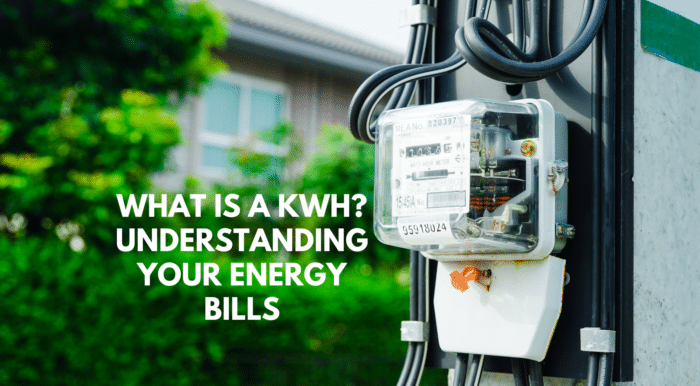To help save money on your electricity bill, it is useful to first understand exactly how you are charged. Your electricity provider charges you on your electrical energy consumption per hour measured in kilowatt hours (kWh).

What is a kilowatt (kW) and what is a kilowatt hour (kWh)?
A kilowatt or (kW) is a unit of power, which represents the rate at which energy is used or produced. One kilowatt is equal to 1000 watts and is the universal standard for measuring electricity. The (h) added to (kW) to make (kWh) is the unit of time, measured in hours. A kilowatt hour (kWh) measures the amount of energy used in one hour using this simple equation. Energy (kWh) = Power (kW) x Time (h).
The more kilowatts you use the more you pay
So how does this work in practice? Firstly, below are a few examples to help explain how you are charged. The below examples are based on your energy supplier charging you £0.34 per kWh.
Example 1:
If you have a device with a power rating of 1 kilowatt and you use it for 3 hours, the energy consumed would be 3 kilowatt-hours (kWh).
(Power) 1kW x (Time) 3 hours = (Energy) 3kWh
(Energy) 3kWh x (Electricity Cost) £0.34 per kWh = £1.02
Example 2:
If you have 10 x 100 watt light bulbs on for 10 hours.
10 x bulbs x 100W = 1000W. 1000W = 1kW
(Power) 1kW x (Time) 10 hours = (Energy) 10kWh
(Energy) 10kWH x (Electricity Cost) £0.34 (per kWh) = £3.40
Now take a look at your energy bill, it should start to make much more sense, it really is that simple.
What determines the price you pay per kWh?
The unit price (kWh) you pay for your electricity depends on your supplier, meter type, region and the demand for electricity at any given time.
There are two main factors you can focus on when choosing your electricity supplier:
- The unit rate – in kilowatt hours (kWh)
- The standing charge – this is the flat fee charged daily to pay for everything needed to get the energy to your property via the National Grid.
When comparing energy deals, check these carefully. Whilst one supplier may have a low kWh unit rate, the price of their standing charge may be high. Therefore, you need to take care to figure out what will work best for you.
How can I save money now I understand my energy bills?
Everything with a switch costs money and impacts your carbon footprint, but now you know how much 1 kWh of electricity costs and how to convert kWh into pounds and pence, you can start to make real changes to save on your energy bill.
Start by working out your average kWh per day for your main household appliances, once you have an estimate of how much these are costing, you can then alter your habits accordingly to save money.
Say you have a brand-new large-screen TV with a 500 W power rating (kW rating of 0.5). Multiply 0.5kW by the time you spend watching it – say 4 hours a day. Your 0.5 kW TV uses 2 kWh per day. Then multiply this by your electricity unit price (taken from your energy bill) (say £0.34 per unit): 2kWh x £0.34 = £0.68 per day or £248.20 per year.
You can apply the above principle to all your main appliances to build up a much better picture of where your energy is being used most or even wasted.
Understanding how much you spend on energy and on what appliances, will undoubtedly promote a more positive, pro-active approach to how you view your energy usage.
Every little change you make will help to save money and reduce your carbon footprint.
More ways to save money on your energy bills
If you enjoyed this article and are interested in other tips to save on your energy bills, please read one of the articles below:
- Energy Saving Tips for Autumn/Winter
- How you can save on your energy bills
- How to choose energy efficient appliances
- Who is entitled to Free Home Insulation?
You can also read lots more energy saving tips on our Energy Savings Tips blog page.